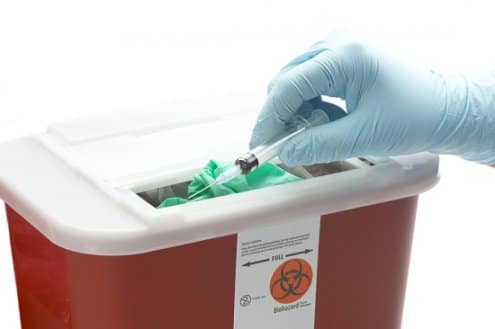Living with diabetes is tricky. You must continually monitor your blood glucose levels to ensure they don’t drop too low, which is often an uncomfortable process that involves finger sticks and fiddling with testing machines. Additionally, there’s the discomfort and inconvenience that comes with the need for regular insulin injections.
The plight of the injection, unfortunately, doesn’t end there. Once you use a syringe and it disappears beneath the skin, the needle becomes a biohazardous object that must be disposed of properly.
How to Dispose of Expired / Unused Insulin Vials
Expired insulin may still be biologically active and a vial containing even a small amount of unused insulin could cause serious injury if it is accidentally ingested. To properly dispose of expired or unused vials of insulin, place them in a container for biohazardous and regulated medical waste.
Sharps Disposal (Needles & Syringes)
The best way to dispose of used insulin syringes is to place them in an approved sharps container immediately after use. These can typically be purchased from a pharmacy, or obtained for free from a doctor, hospital, or health care institution.
Sharps containers are specially designed to be puncture proof. Therefore, it is essential that no attempt be made to place the plastic shield back on the tip of the needle as this can result in serious injury. The used, unshielded needle should be placed directly into the container.
Containers are considered full upon reaching three quarters and should not be overfilled. It is not recommended to dispose of sharps containers in the regular trash. A municipal waste disposal agency should be contacted to inquire about proper arrangements for the disposal of used sharps containers.
Insulin Pen Disposal
Insulin pens often contain autoinjector devices, which have the potential to cause serious injury if they are improperly handled after use. Once used, insulin pens should be placed in an approved sharps container that will be sealed and disposed of appropriately.


